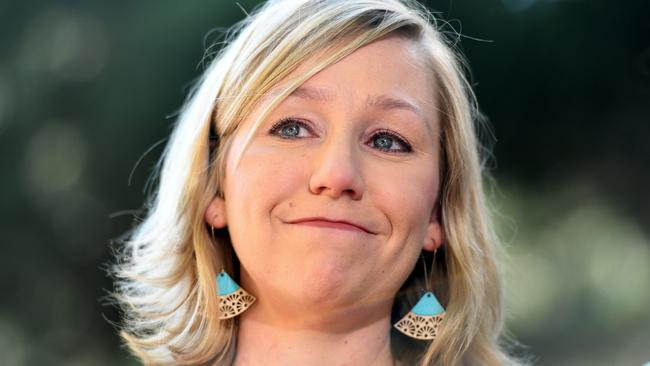Opinion: Change oath of citizenship and this political problem is solved
THE Citizenship clause that brought down two Green senators doesn’t suit a nation where so many who serve us were born in other lands. Whatever previous loyalties, only the last oath should count.

Opinion
Don't miss out on the headlines from Opinion. Followed categories will be added to My News.
“THE fact that a person born in another country is prepared to stand up in public and become an Australian citizen seems to me a reasonable step towards renouncing any former allegiance. For our purposes, swearing allegiance to Australia should invalidate any previous loyalties.’’
It would apply to the hurriedly departed Green senator Scott Ludlam but I actually wrote that nigh on 20 years ago when referring to One Nation’s Heather Hill.
Hill had to give up her Senate seat for the same reasons as did Ludlam.
Hill and Ludlam had taken Australian citizenship but neglected to renounce their former citizenships, hers as British, his as New Zealander.
When I wrote “she is the Australian many wanted to represent them in the Senate … and it is hard to accept that the law is able to frustrate the will of the people’’, I might have been referring to tearfully departed senator Larissa Waters but, again, it was Hill.
Hill thought her British birth and later oath of Australian citizenship entitled her to stand for Parliament and it took the High Court to finally determine she was wrong.
Waters, born in Canada to Australian parents and brought to Australia as a baby, had foolishly presumed she had no need to embrace or renounce any citizenship.
Ludlam, a smart lad in other ways, should have been aware of the landmark Hill case and Waters should have been more inquisitive when talking to her parents.
Each should have been more careful when signing on the dotted line to run for the Senate and the Greens should have been more diligent.
We rightly scoff at them as incompetent, lazy and stupid but the fact remains that elected representatives can and are stripped of office through an unnecessarily harsh reading of a section of the Constitution.
Ludlam, Waters, Family First’s Bob Day, One Nation’s Rod Culleton and Hill all fell victim to section 44.
The subsections that brought down Day and Culleton stand up as well as they did in 1901.
The citizenship clause that sank Ludlam and Waters (and Hill) hasn’t worn nearly so well.
Written in simpler times, its interpretation is not well suited to a nation where so many who serve were born in other lands.
The fact four early prime ministers – Andrew Fisher, George Reid, Joseph Cook and Billy Hughes – were born in Britain caused no distress in those days of imperial certainty. Nor did there seem a problem with Chris Watson, born in Chile and of German and NZ parentage.
But an evolutionary process that ended with the Australia Act of 1986 irrevocably altered the notion of citizenship.
So the High Court was able to rule that the UK was a foreign power and that Hill (and others) should have taken “reasonable steps’’ to renounce their former citizenships.
Those of us who inherited citizenship at birth might think it is a simple matter, so you may wonder why recent events have sent politicians scurrying in search of their pedigrees and why some (including Tony Abbott) have issued statements to prove their eligibility to sit.
Despite this, you just know that somewhere, some time, someone else will eventually be caught in the same bind. Nobody would have a problem with the basic citizenship clause but the interpretation of the “reasonable steps” to renounce former loyalties verges on the unreasonable.
Whatever previous citizenships or loyalties, it is the last oath that should count, just as a last will invalidates previous testaments.
To change section 44 would be as difficult as moving the earth into another orbit. What can be changed is the wording of the oath of citizenship, which seems to have been something of a captain’s call, to reinstate the renunciation of other allegiances.
It seems reasonable that the oath could then be given legislative recognition as the formal divestment of former citizenship and loyalties.
Belgium accepts it, as Senator Mathias Cormann has told us, and it could work for us without trespassing on the Constitution.
Hill, Ludlam and Waters did wrong but we shouldn’t make it more difficult for people to do right.
Much has been made of whether Ludlam and Waters should pay back their salaries but the precedent of waiving repayment for Day would seem to preclude that.
But another section of the Constitution (46) says that, until the Parliament decides otherwise, anyone incapable of sitting as senator or as an MP “shall for every day on which he so sits, be liable to pay the sum of £100 (about $15,000 today) to any person who sues for it in any court of competent jurisdiction’’.
That seems no more reasonable or realistic than the renunciation requirement.


